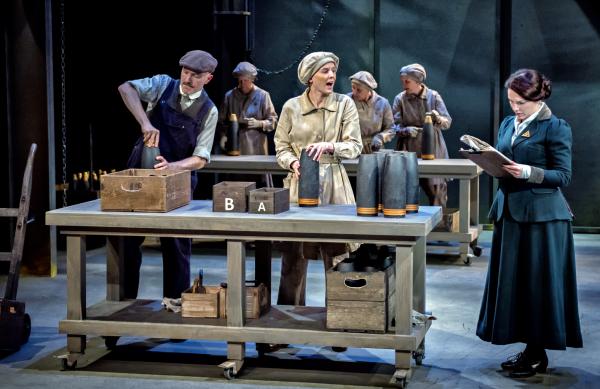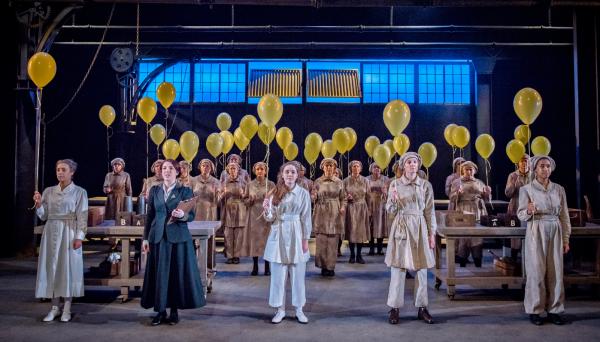search
date/time
 | Yorkshire Times A Voice of the Free Press |

Phil Hopkins
Group Travel Editor & Theatre Correspondent
@philhopkinsuk
10:26 AM 24th June 2016
arts
Lest We Forget The Barnbow Lasses

Dominic Gatley Colette O'Rourke & Kristin Atherton in Barnbow Canaries. Photo by Anthony Robling
However, when you look at the impact of such global issues at a micro level, then understanding often becomes so much clearer, specifically when that micro perspective centres around an individual, tailored story.
Alice Nutter's Barnbow Canaries examines the First World War from the viewpoint of those girls who stepped into the shoes of their soldier menfolk, by taking up arms, or should we say the production of arms, at the Barnbow munitions factory in Cross Gates, Leeds when it opened in 1915.
It is a fascinating story and works brilliantly because of its goldfish bowl view of a far more complex concept, the so-called Great War. Alastair Whatley's adaptation of Sebastian Faulks' Birdsong last May did the same, as did Northern Broadsides' An August Bank Holiday Lark a year earlier.
All three tell micro stories that leave you feeling wounded by the far greater event of which all the players were part.

Barnow Canaries. Photo by Anthony Robling
At first you sense the jolly jingoism of the 'Barnbow lasses', the Munitionettes, as they seek to make the best of a bad situation but, as the play unwinds, we witness the emerging tragedy as they all become victims of the very thing they purport to be supporting.
They are highly paid but underpaid by comparison with their male counterparts, their jobs are only guaranteed for the duration of the War, after which they are destined to a life back in service or accusations of being unpatriotic if they deign to protest at their treatment.
At one point 35 people lost their lives at Barnbow in the explosion of December 1916, and for those that survived, there was the prospect of becoming ill from lethal TNT poisoning which left its victims yellow and jaundiced looking.
They became War victims as much as the Tommies on the front line, and as yellow as those canaries once lowered into the pits to test for deadly gas.
This was a moving play by Alice Nutter which revolved around the lives of sisters, Edith and Agnes, one steeped in duty and the belief that all men should be in uniform and fighting the cause, the other, more of an opportunist keen to take advantage of Barnbow's higher wages. Both ended the play as victims; one dying, the other mourning her sister's loss whilst witnessing friends injured and colleagues killed.
Colette O'Rourke as Agnes was rough and ready and, if at first you ended up disliking this know all opportunist, you couldn't help feeling sorry for her as she mourns the loss of Tilly Steele's Edith, her sister and daily sparring partner. Both credible performances.
This play is particularly pertinent for Leeds audiences, many of whom will know of the Barnbow factory.
However, at its most primal level, Barnbow Canaries is a story about people that evokes sadness, compassion and sorrow as individuals are invited to witness the sadness of War and commiserate with its victims.
Barnbow Canaries
West Yorkshire Playhouse
Until July 6th